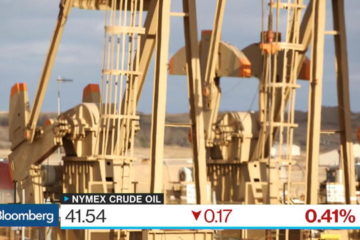Dollar Halts Rally With U.S. Stocks Little Changed; Bonds Climb

©2016 Bloomberg News
O4RP956KLVR8
(Bloomberg) — The dollar weakened for the first time in seven days, while Treasuries rose after a report showed the Federal Reserve’s preferred prices measure slowed in February, damping inflation expectations. U.S. stocks meandered amid the slowest trading day of the year.
The Bloomberg Dollar Spot Index snapped its longest rally since January as the data showed U.S. personal spending barely increased in February and the prior month’s advance was revised down. Ten-year Treasury yields slipped to their lowest level in three weeks as gold rose, while the yen slipped. the Standard & Poor’s 500 Index edged up 0.1 percent in volumes that were more than 36 percent below their 30-day average, while the Nasdaq Composite Index fell that amount. U.S. crude oil fell toward $39 a barrel in New York.
U.S. equities faltered last week after Federal Reserve officials reinvigorated the prospect of interest rates being hiked as soon as the economic data warrant. Investor sentiment remains fragile in the wake of the worst start to a year for equities on record, amid concern China’s slowdown and political upheaval in some emerging markets will derail global expansion. The American spending data offset a report from Friday that showed the American economy grew faster than previously expected last quarter. Stock markets in Australia and in many parts of Europe were closed Monday for Easter holidays.
“The market is giving a slightly better tone,” said Michael James, managing director of equity trading at Wedbush Securities Inc. in Los Angeles. “Nothing negative has occurred over the weekend to derail the continued positive tone that the market has exhibited over the last six weeks. We pulled back a little last week, and there might still be people that remain too short that will continue to cover as the market shows resilience.”
Stocks
The S&P 500 rose to 2,037.05 as of 4 p.m. in New York, after the first weekly decline since Feb. 12 halted a rally that added more than $2 trillion to the value of U.S. stocks. The index had advanced for five straight weeks, wiping out all of its 2016 losses, before a three-day drop at the end of last week signaled the recovery may be running out of steam.
This week will provide ample insight on the state of the world’s biggest economy, with reports due on employment, manufacturing, housing and consumer confidence.
“There’s a lot of uncertainty still out there,” said Matt Maley, an equity strategist at Miller Tabak & Co LLC in New York. “There’s really no impetus to get people to do something definitively before that data. People have more of an excuse than usual to sit on their hands.”
Six of the S&P 500’s 10 main industries increased, with consumer discretionary companies adding 0.5 percent to lead gains. Starwood Hotels & Resorts Worldwide Inc. climbed 2 percent after saying it received a higher takeover offer from a group led by Anbang Insurance Group Co. General Electric Co. jumped 1.2 percent to its highest level since May 2008.
Media and apparel companies rallied, even amid the tepid growth in consumer spending. PVH Corp. and Ralph Lauren Corp. advanced more than 0.9 percent. Time Warner Inc. added 3.6 percent for its best day in six weeks, after “Batman v Superman,” the first of 10 superhero movies planned by Warner Bros., opened with weekend sales of $166.1 million in North American theaters.
Around 5.2 billion shares changed hands on U.S. exchanges Monday, the least since Dec. 30, according to data compiled by Bloomberg.
Futures on Asian indexes were mixed, with Chicago-traded contracts on Japan’s Nikkei 225 Stock Average jumping 1.3 percent, while futures on Hong Kong’s Hang Seng and Hang Seng China Enterprises indexes dropped at least 0.7 percent.
Currencies
Bloomberg’s Dollar Spot Index, which tracks the greenback against 10 major peers, slipped 0.4 percent following its biggest weekly increase since November.
“The dollar is really not your best bet right now,” Vassili Serebriakov, a foreign-exchange strategist at BNP Paribas SA in New York, said in an interview on Bloomberg TV. “Every time you have the dollar rising, concerns about China devaluation, concerns about emerging-market growth, concerns about commodity markets — those start to resurface and that’s what we think is going to stop the Fed from hiking.”
Traders will watch a speech by Fed Chair Janet Yellen Tuesday for clues about the central bank’s rate path, followed by monthly labor data later in the week. The dollar’s resilience may depend on how the economy weathers turbulence from overseas. The currency has slumped more than 4 percent since the end of January on speculation U.S. policy makers will refrain from tightening rates amid a dimming outlook for global growth.
Emerging Markets
The MSCI Emerging Markets Index rose 0.1 percent Monday as Brazilian stocks advanced with the real. Investor optimism that there will be a possible change in the nation’s government outweighed concern that the U.S. is inching closer toward a rate increase. Many developing-nation markets remained closed for the Easter holidays.
The Shanghai Composite Index dropped 0.7 percent after capping its second weekly gain. The Chinese equity gauge rose as much as 1 percent earlier in the session after the National Bureau of Statistics said on Sunday that industrial profits broke a seven-month losing run to climb 4.8 percent from a year earlier in the January-February period.
Investors added $1.45 billion to U.S. exchange-traded funds that buy emerging market stocks and bonds last week in the longest stretch of gains since May.
Commodities
Gold rose in the spot market, adding 0.4 percent to $1,221.61 an ounce, while silver added the same amount.
Copper futures posted their steepest gain in six sessions as the economic data out of the U.S. and China boosted demand prospects, while the weaker dollar made commodities cheaper in other currencies.
West Texas Intermediate oil futures fell 0.2 percent to settle at $39.39 a barrel amid speculation that a meeting of crude-producing countries next month won’t ease a global supply glut. Rigs targeting oil in the U.S. fell by 15 to 372 last week, according to Baker Hughes Inc. More than 150 have been parked since the start of the year.
Oil has climbed back from a 12-year low reached earlier this year on speculation the global surplus will ease as U.S. output declines and major producers including Saudi Arabia and Russia proposed an output freeze. Iran and Libya are the only two OPEC members that haven’t pledged to attend talks over a production cap next month.
–With assistance from Lananh Nguyen and Emma O’Brien.
To contact the reporters on this story: Jeremy Herron in New York at jherron8@bloomberg.net; Joseph Ciolli in New York at jciolli@bloomberg.net To contact the editors responsible for this story: Emma O’Brien at eobrien6@bloomberg.net Jeremy Herron







No Comment